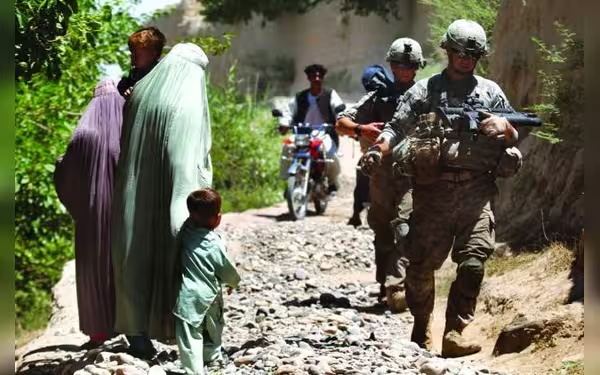Wednesday, January 15, 2025 01:02 PM
Women’s Vital Role in Peace Negotiations
- Exclusion of women undermines peace negotiations.
- Women's voices lead to effective conflict resolution.
- Inclusion enhances prospects for sustainable peace.
 Image Credits: thefridaytimes
Image Credits: thefridaytimesThe exclusion of women from peace negotiations hinders effective conflict resolution and sustainable peace.
The role of women in peace negotiations has often been overlooked, despite the growing recognition of their importance in conflict resolution. The saying, "If you are not at the table, you are on the menu," highlights the critical need for women's voices in discussions that shape the future of societies torn apart by war. When women are excluded from these vital conversations, the outcomes tend to be less effective, leaving many issues unresolved and many voices unheard.
UN Security Council's Resolution 1325 emphasizes the necessity of women's participation in peace processes. UN Secretary General Antonio Guterres has pointed out that violence against women is a significant barrier to achieving human rights and sustainable peace. Unfortunately, in many ongoing conflicts around the world, women are not only victims of violence but are also sidelined in the very discussions that could lead to peace. This exclusion creates a cycle where women's unique experiences and perspectives are ignored, leading to inadequate solutions for complex conflicts.
In recent conflicts, such as the Russian-Ukraine war and the Israel-Gaza war, women have suffered immensely. They face horrific crimes, including sexual violence and physical harm, yet their contributions to peace efforts are often dismissed. The absence of women in diplomatic discussions diminishes the chances of achieving lasting peace. However, women have shown remarkable resilience, organizing protests and movements to demand change. For instance, the Way Home movement, led by Russian mothers and wives of soldiers, has been a powerful example of how women can influence public opinion against war.
Gender issues are frequently overlooked in conflict and post-conflict agendas. The peace talks in Afghanistan, for example, failed to address women's rights, resulting in dire consequences for Afghan women under Taliban rule. Similarly, in Sudan, the lack of women's inclusion in peace processes has led to gender-blind institutions, further endangering women's rights. Heather Barr from Human Rights Watch has criticized the minimal inclusion of women in peace talks, emphasizing the need for their voices to be heard.
Women bring valuable real-life experiences and alternative solutions to the negotiating table. Daisaku Ikeda's words remind us that those who understand the brutal reality of war must unite for peace. Involving women in peace negotiations not only enhances the prospects for peacebuilding but also creates a broader support network that addresses inequality. Female delegates can highlight the challenges faced by ordinary women and provide crucial information to their counterparts, fostering effective collaboration among various women's civil society groups.
Betty Williams, a Nobel Peace Laureate, believed that simple acts of kindness and dialogue could change hearts and minds. In today's world, where wars continue to rage, her words resonate deeply. Nonviolence, she asserted, is not a weapon of the weak but of the strong. Glenda Sluga's insights further emphasize that women have historically drawn on unique examples and forged alternative paths in the pursuit of peace.
Despite the challenges they face, women have emerged as powerful voices in war-torn regions. They have taken on roles as war journalists and peace activists, shedding light on the human suffering caused by conflict. Therese Bonney, a photojournalist during World War II, exemplified this courage by capturing the harsh realities of war. Similarly, Bisan Owda, a Palestinian journalist, has documented her experiences during the Israel-Hamas conflict, showcasing the resilience and strength of women in the face of adversity.
The inclusion of women in peace negotiations is not just a matter of fairness; it is essential for achieving sustainable peace. Their unique perspectives and experiences can lead to more comprehensive solutions to conflicts. As we move forward, it is crucial to ensure that women's voices are not only heard but actively sought in discussions that shape our world. Only then can we hope to build a future where peace is not just a dream but a reality for all.













